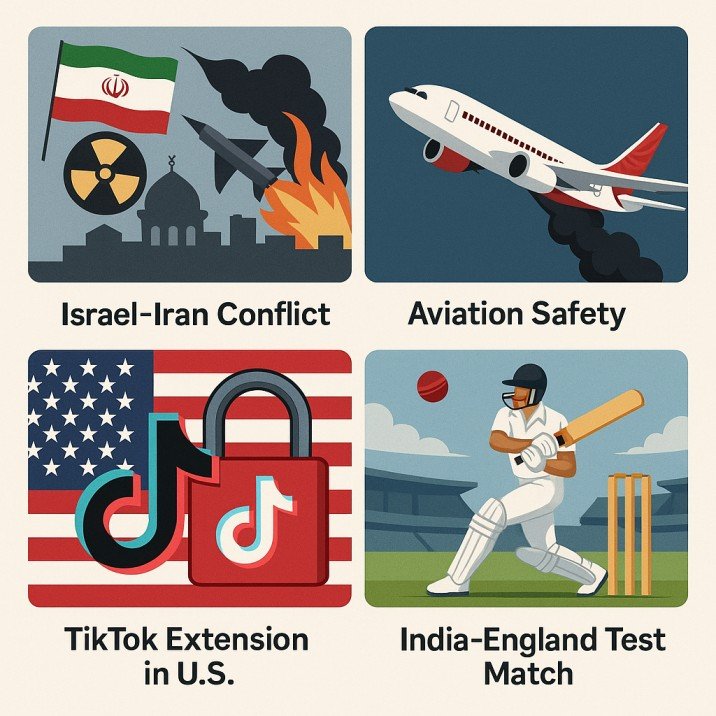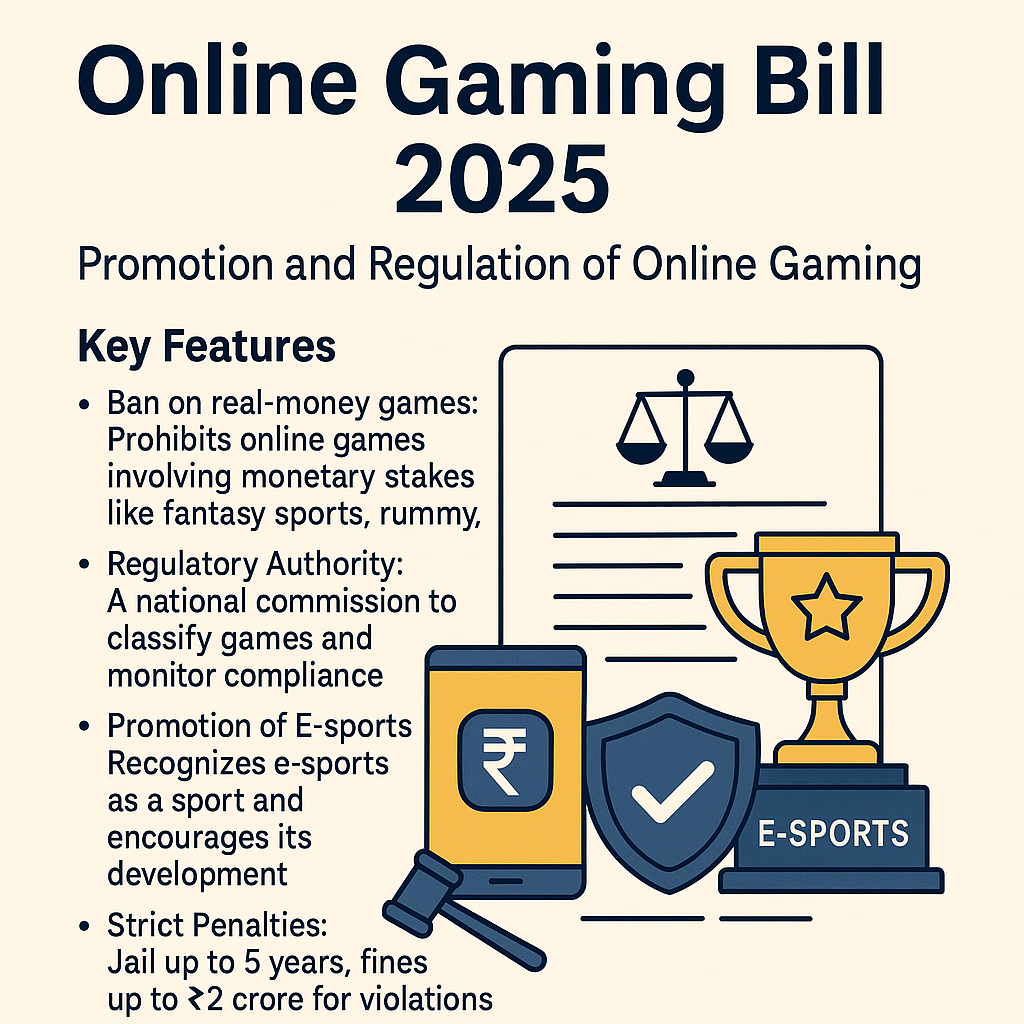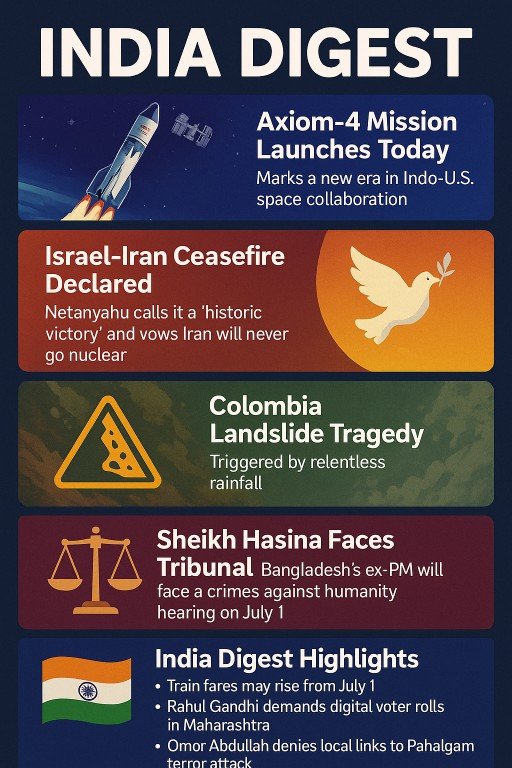1. Morning Digest: Top Stories Overview
Published at 06:24 AM IST on June 20, 2025, the Morning Digest curates significant national and international stories, offering a snapshot of critical developments.
Key Topics:
- Israel-Iran Conflict: Israel conducted overnight strikes on Iranian military targets, including a nuclear research site, following Iran’s missile attack on June 19, 2025, which damaged Soroka hospital. The U.S. is deliberating involvement, with President Trump’s decision expected within two weeks. India’s Commerce Ministry is assessing trade disruptions, particularly to oil imports.
- Aviation Safety: The investigation into the Air India Boeing 787-8 crash in Ahmedabad (June 12, 2025) continues, with the Ministry of Civil Aviation evaluating black box data decoding for technical, safety, and security considerations.
- TikTok Extension in the U.S.: President Trump signed an executive order on June 19, 2025, extending TikTok’s operations by 90 days to negotiate U.S. ownership, reflecting global tech policy debates.
- India-England Test Match: The first Test match against England began on June 20, 2025, in Leeds, with expectations of a “good surface” due to dry weather, boosting national interest in sports.
Relevance for IAS:
- Prelims: Memorize key dates (e.g., Air India crash: June 12, 2025; Soroka attack: June 19, 2025) and facts (e.g., TikTok’s 90-day extension, India-England Test start).
- Mains: Analyze India’s strategic neutrality in the Israel-Iran conflict (GS-2: International Relations), aviation safety governance (GS-3: Infrastructure), and global tech regulations (GS-3: Technology).
2. Letters to The Editor: Public Discourse
Published at 00:24 AM IST on June 20, 2025, this section captures reader opinions on topical issues, reflecting public priorities and debates.
Key Topics:
- Aviation Safety Concerns: Readers likely demand accountability for the Air India crash, which killed former Gujarat CM Vijay Rupani, emphasizing systemic aviation reforms.
- Political Polarization: Responses may address Kerala CM Pinarayi Vijayan’s criticism of RSS-linked imagery at Raj Bhavan or Amit Shah’s push for Indian languages over English (June 19, 2025).
- Global Issues: Opinions on the Israel-Iran conflict or Trump’s TikTok decision may highlight public awareness of international developments.
- Free Speech: Readers may comment on the Supreme Court’s June 19, 2025, remarks on mob violence threatening artistic expression, a growing societal concern.
Relevance for IAS:
- Prelims: Understand public sentiment on issues like aviation safety, linguistic nationalism, and free speech.
- Mains: Use reader perspectives to enrich answers on governance (GS-2), societal polarization (GS-1), and freedom of expression (GS-2: Polity). The Supreme Court’s stance is key for essays on free speech vs. public order.
3. Delhi’s Air Quality: Environmental Governance
Published at 07:51 AM IST on June 20, 2025, this article highlights Delhi’s cleanest air in eight months (AQI 89), credited to the government’s 100-day action plan, alongside an IMD thunderstorm alert.
Key Topics:
- Air Quality Improvement: Measures like road sweeping (6,482 km in 24 hours) and water sprinkling (744 kilolitres daily) reduced the AQI to 89.
- Policy Framework: Aligns with the National Clean Air Programme (NCAP) targeting a 40% PM10 reduction in 130 cities by 2026 (2019-20 baseline).
- Weather Challenges: The IMD’s thunderstorm alert signals potential disruptions to air quality efforts.
Relevance for IAS:
- Prelims: Know AQI (89 on June 20, 2025), NCAP target (40% PM10 reduction by 2026), and key measures.
- Mains: Discuss environmental governance (GS-3: Environment) and urban pollution mitigation. Useful for essays on sustainable urban development.
4. Israel-Iran Conflict: Trade and Geopolitical Implications
Published at 06:43 AM IST on June 20, 2025, this article details Israel’s strikes on Iranian military and nuclear sites, with India assessing trade impacts.
Key Topics:
- Conflict Developments: Israel targeted Iran’s nuclear facilities (e.g., Arak reactor, Natanz enrichment site) after Iran’s missile strike on Soroka hospital and Tel Aviv residences on June 19, 2025. Iran warned the U.S. against involvement.
- India’s Economic Concerns: The Commerce Ministry’s June 20 meeting focuses on disruptions to oil imports, shipping lines, and exports, given India’s reliance on Middle Eastern oil.
- Diplomatic Neutrality: India’s stance, reinforced by PM Modi’s rejection of U.S. mediation on Pakistan (June 17, 2025) and Jaishankar’s talks with Iran and Israel (June 13, 2025), emphasizes strategic autonomy.
Relevance for IAS:
- Prelims: Note dates (e.g., Soroka attack: June 19, 2025) and India’s oil import dependency (80% from the Middle East).
- Mains: Analyze India’s diplomatic balancing act (GS-2: International Relations) and economic impacts of global conflicts (GS-3: Economy). Useful for essays on India’s foreign policy.
5. World Refugee Day: Humanitarian Perspectives
While not explicitly listed in the June 20 feed, World Refugee Day (June 20, 2025) is likely covered due to its global significance and relevance to ongoing conflicts.
Key Topics:
- Global Refugee Crisis: Commemorates 26 million refugees displaced by war, violence, or disasters (UNHCR, mid-2024 data).
- India’s Role: Hosts refugees (e.g., Tibetans, Sri Lankans) but is not a signatory to the 1951 Refugee Convention, balancing humanitarian aid with security.
- Conflict Linkages: The Israel-Iran conflict may worsen displacement, impacting India’s regional policies.
Relevance for IAS:
- Prelims: Know refugee numbers (26 million globally) and India’s non-signatory status.
- Mains: Discuss India’s refugee policy (GS-2: International Relations) and social integration challenges (GS-1). Useful for essays on humanitarian crises.
6. Linguistic Nationalism: Hindi in Maharashtra Schools
Reported on June 18, 2025, the controversy over Hindi as a third language in Maharashtra schools remains relevant in public discourse on June 20.
Key Topics:
- Policy Implementation: A June 17, 2025, Government Resolution mandated Hindi as the third language for classes 1-5 in Marathi and English medium schools, with options for other Indian languages (minimum 20 students).
- Political Backlash: Opposition labeled it a “betrayal,” while CM Devendra Fadnavis defended it as promoting a widely spoken language.
- Public Debate: Likely reflected in Letters to The Editor, highlighting linguistic identity tensions.
Relevance for IAS:
- Prelims: Know policy details (e.g., June 17 GR, classes 1-5) and key figures (e.g., Fadnavis).
- Mains: Analyze linguistic nationalism vs. regional identity (GS-1: Indian Society) and federalism issues (GS-2: Polity). Useful for essays on language policies.
7. RSS and Cultural Nationalism: Political Dynamics
The RSS’s role in cultural and political debates, reported recently, likely features in June 20 public discourse via Letters to The Editor or related coverage.
Key Topics:
- Kerala Controversy: Kerala CM Pinarayi Vijayan criticized the display of a Bharat Mata portrait at Raj Bhavan as promoting the RSS’s ideological agenda (June 19, 2025).
- West Bengal Strategy: The RSS plans Hindu Sammelan events post-Durga Puja to consolidate Hindu votes for the BJP in West Bengal’s 2026 elections, focusing on “unity and peace.”
- Secularism Debate: CPI(M)’s M.A. Baby (June 14, 2025) called for countering the RSS-BJP’s “fake cultural nationalism” to protect secularism.
Relevance for IAS:
- Prelims: Note events (e.g., Raj Bhavan controversy, Hindu Sammelan plans) and figures (e.g., Vijayan, Baby).
- Mains: Discuss cultural nationalism vs. secularism (GS-1: Indian Society) and federal tensions (GS-2: Polity). Useful for essays on India’s secular fabric.
8. Manipur Violence: Security and Governance Challenges
The Morning Digest likely references ongoing violence in Manipur, with recent curfews and internet bans in five districts following the arrest of an Arambai Tenggol member on June 7, 2025.
Key Topics:
- Security Measures: An indefinite curfew in Bishnupur and prohibitory orders in four other districts (Kakching, Thoubal, Imphal East, Imphal West) were imposed after the NIA-Manipur Police arrested Kanan Meitei.
- Public Response: The Arambai Tenggol lifted a shutdown but demanded their leader’s release, reflecting ethnic and security tensions.
- Governance Critique: Congress leader Jairam Ramesh (June 8, 2025) criticized President’s Rule as ineffective amid persistent violence.
Relevance for IAS:
- Prelims: Know dates (e.g., curfew: June 7, 2025) and groups (e.g., Arambai Tenggol).
- Mains: Analyze internal security challenges (GS-3: Security) and federal governance issues in Manipur (GS-2: Polity). Useful for essays on Northeast India’s stability.
Why These Topics Matter for IAS Aspirants
- International Relations (GS-2): The Israel-Iran conflict and India’s trade concerns test strategic autonomy and economic resilience.
- Governance and Infrastructure (GS-2, GS-3): The Air India crash probe, Delhi’s air quality, and Manipur’s violence highlight institutional accountability and policy challenges.
- Social and Cultural Issues (GS-1): Linguistic nationalism, RSS strategies, and free speech debates reflect India’s diverse societal dynamics.
- Humanitarian and Security Issues (GS-2, GS-3): World Refugee Day and Manipur’s unrest underscore India’s humanitarian and security policies.
- Current Affairs: These topics align with UPSC’s focus on dynamic issues, critical for prelims facts and mains analytical answers.
Quick Revision Tips
- Mnemonics: For Israel-Iran, use “Soroka, June 19, Iran missile.” For Delhi AQI, use “89, 100-day plan, NCAP.” For Air India, recall “AI171, June 12, Ahmedabad.” For Manipur, use “Bishnupur curfew, June 7.”
- Linkages: Connect Israel-Iran to oil imports (GS-3), air quality to NCAP (GS-3), RSS controversies to secularism (GS-1), Manipur to internal security (GS-3), and refugee day to India’s non-signatory status (GS-2).
- Practice: Write 150-word mains answers on “India’s response to Middle East conflicts,” “Delhi’s air pollution strategy,” “Manipur’s security challenges,” or “Linguistic nationalism in India.” Draft essay outlines on “Secularism vs. cultural nationalism” or “India’s refugee policy challenges.”
This updated analysis incorporates additional topics from the Morning Digest and other June 20, 2025, articles, equipping IAS aspirants with essential insights. For full details, visit www.thehindu.com.[](https://www.thehindu.com/news/morning-digest-june-20-2025/article69715961.ece)



